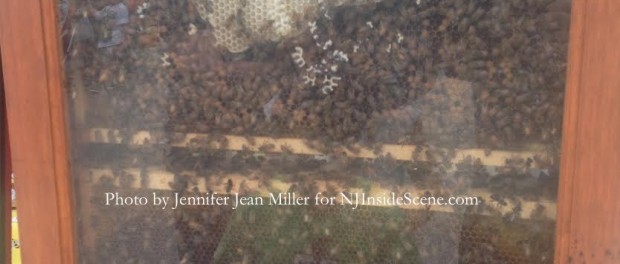Dancer-Space Bee Bill Package Signed into Law
 Bees busy at work at the Top of the Mountain Honey Bee Farm at the Blairstown Farmers' Market. Photo by Jennifer Jean Miller.
Bees busy at work at the Top of the Mountain Honey Bee Farm at the Blairstown Farmers' Market. Photo by Jennifer Jean Miller.
TRENTON, N.J. – Three bills Assemblymen Ron Dancer and Parker Space sponsor designed to protect the state’s commercial and recreational bee industry and heighten public awareness about its importance to our food supply were signed into law today by Acting Gov. Kim Guadagno.
According to the State Department of Agriculture, more than 80 percent of U.S. food crops are pollinated by honeybees. In New Jersey, pollination is crucial for its blueberry, cranberry, pumpkin, squash, strawberry, peach and apple crops.
“People have an inherent fear of bees because they really know little about the various species of bees, their behavior and their importance to agriculture,” stated Dancer, R-Ocean, Burlington, Middlesex and Monmouth. “These measures will educate the public about the importance of bees to our food chain, provide additional protections to commercial and hobbyist beekeepers and encourage residents to support beekeepers.”
“New Jersey’s $7 million honey bee industry contributes to the production of nearly $200 million worth of fruits and vegetables annually,” stated Space, R-Sussex, Warren and Morris, whose family is well-known for its long-standing agricultural commitment in Sussex County that spans eight generations. “These measures will provide additional protections to the state’s 3,000 commercial and hobbyist beekeepers while ensuring they conform to safety standards.”
The following measures all received unanimous support in both houses:
Bill A-1294/S-1328 extends” Right to Farm” protections to commercial beekeepers to protect them from nuisance complaints. Currently, if a complaint is filed, the case is referred to a municipal court which can be time consuming and costly.
The second bill, A-1295/S-1975, protects hobbyist beekeepers by authorizing the state to regulate the keeping of beehives while at the same time giving municipalities a role in managing this growing hobby. Beekeeping as a hobby is gaining popularity in New Jersey in both urban and suburban areas.
The third bill, A-1296/S-2302, establishes a fine of up to $500 for each offense when an individual intentionally destroys a man-made native bee hive. A native bee is native to the state and, unlike a honeybee, does not produce honey, but provides for the pollination of crops and plants.






Leave a comment
You must be logged in to post a comment.